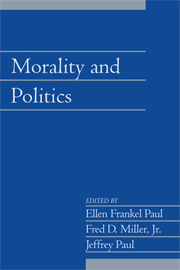Book contents
- Frontmatter
- Contents
- Introduction
- Acknowledgments
- Contributors
- What's Morality Got to Do With It? Making the Right Distinctions
- Unauthorized Humanitarian Intervention
- Thinking Constitutionally: The Problem of Deliberative Democracy
- Representing Ignorance
- Dual Citizenship and American Democracy: Patriotism, National Attachment, and National Identity
- Policy Implications of Zero Discounting: An Exploration in Politics and Morality
- Reflections on Espionage
- Mr. Pinocchio Goes to Washington: Lying in Politics
- A Subject of Distaste; An Object of Judgment
- Against Civic Schooling
- Political Morality as Convention
- Autonomy and Empathy
- God's Image and Egalitarian Politics
- Should political Liberals Be Compassionate Conservatives? Philosophical Foundations of the Faith-Based Initiative
- Index
Mr. Pinocchio Goes to Washington: Lying in Politics
Published online by Cambridge University Press: 04 August 2010
- Frontmatter
- Contents
- Introduction
- Acknowledgments
- Contributors
- What's Morality Got to Do With It? Making the Right Distinctions
- Unauthorized Humanitarian Intervention
- Thinking Constitutionally: The Problem of Deliberative Democracy
- Representing Ignorance
- Dual Citizenship and American Democracy: Patriotism, National Attachment, and National Identity
- Policy Implications of Zero Discounting: An Exploration in Politics and Morality
- Reflections on Espionage
- Mr. Pinocchio Goes to Washington: Lying in Politics
- A Subject of Distaste; An Object of Judgment
- Against Civic Schooling
- Political Morality as Convention
- Autonomy and Empathy
- God's Image and Egalitarian Politics
- Should political Liberals Be Compassionate Conservatives? Philosophical Foundations of the Faith-Based Initiative
- Index
Summary
INTRODUCTION
A more provocative subject than “lying in politics” is difficult to imagine. Everybody, from the proverbial “Joe Sixpack” to ivory-tower philosophers, can wax eloquently on the subject, if only because easy-to-find, shocking (and occasionally sexually “juicy”) examples abound. If moral outrage were judged an essential vitamin, then condemning dishonesty undoubtedly guarantees a daily megadose. Unfortunately, at least for those who crave self-indulgent outrage, the anti-lying case is less than 100 percent compelling. It is a quagmire of the first order, if only because those who cherish frankness also usually confess to lying. Hannah Arendt once suggested that lies are a necessary and justifiable tool of the statesman's trade. Formulating damnation criteria invites mind-boggling paradoxes, and strident defenders of truth-telling, with scant exception, admit that falsehoods are “sometimes” permitted for “good” reasons. And what might be these “good reasons”? Who can say for sure? Centuries of erudite scholarship on this point might be encapsulated as “Lying to me is bad, but I can consent to deceiving others for noble purposes, as artfully decided by myself.”
In this essay, I offer some observations regarding lying that stress its public character—the mendacity of those who are sworn to uphold public trust. I eschew simple morality or facile homilies. The point of departure is that establishing dishonesty is astonishingly complicated, filled with linguistic and cultural vexations—let alone moral predicaments—that bedevil conclusive judgments.
- Type
- Chapter
- Information
- Morality and Politics , pp. 167 - 201Publisher: Cambridge University PressPrint publication year: 2004



